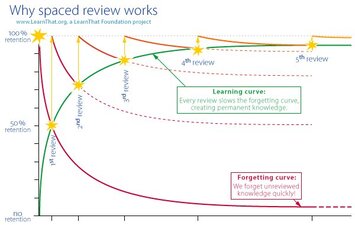 In the previous post, we looked at how Kenneth Gordon Maplewood School applies the Science of Reading through its comprehensive daily Orton Gillingham one on one tutoring session for all students. This post is going to look at the other two pieces of the learning to read puzzle - applying cognitive load theory, and distributed learning strategies to the mix. Working memory is a balancing act. We all juggle pieces of information to solve problems, understand different situations and acquire new knowledge. The amount that we are able to retain and manipulate in our short term working memories is called our cognitive load. The average person can only retain about seven chunks of new information at a time and can usually manipulate only about half of it. Cognitive load theory uses "knowledge of the human brain to design teaching strategies that will maximize learning" for students. In essence it is really looking at how to optimize to load on individual students' working memories to avoid overload and preventing them from mentally shutting down and failing to learn new concepts. Simply put, learning takes place when students successfully transfer new information from their working memories into their long-term memories. Once those decks are cleared, their working memories are open to absorbing new knowledge and begin the process over again. Long-term memory is like have a database in your brain. You can draw on any of your stored memories without effecting your ability to add new learnings. It is one of the reasons why learning processes tend to be sequential, as each new piece of information or concept is laid out and applied on the foundation of previously acquired knowledge. In other words, the more that you can draw on your long term memory, the more you can reduce the cognitive load on your working memory and optimize your learning. At KGMS, this aspect of our practice was highly informed and improved a few years ago through insights gleaned from a New South Wales (Australia) study entitled Cognitive Load Theory in Practice: Ideas for the classroom. It looks at three key steps in the learning process that vary according to the level of knowledge and understanding housed in a student's long term memory - their personal baseline. The steps are simple and not surprising: 1. When teaching new content to students without much pre-existing knowledge, teachers should provide students with lots of detailed, fully guided instruction; 2. As the students’ knowledge and skill increases, teachers should provide a mix of guided instruction and problem-solving practice; and, 3. Finally, as students become very proficient, teachers should provide minimal guidance and allow students to practise their skills with lots of problem-solving tasks. Some students will progress to independent problem-solving faster than others. A lot of this seems intuitively logical, but it doesn't mean that we always practice it. A great many classrooms ignore steps one and two and jump to learning by discovery - asking students to research issues or solve complex problems in an information vaccum. As a result the learning ends up being disjointed and its utility is transitory and quickly forgotten. Very little gets stored in a student's long-term memory. To make the learning "stick" it is essential to follow the third pillar of the process, distributed learning. The idea behind distributed learning, that the use of constant repetition and reinforcement to firmly root information in long-term memory, it not new. It has long been known as Ebbinghaus's Forgetting Curve. Ironically, although Ebbinghaus's research was something that I had learned about as an education student in the 1970s, I had totally forgotten about it! In the 1880s, Hermann Ebbinghaus conducted research with respect the factors that could support the strengthening of memory for individuals and his results are widely accepted as a general theory for how we learn and retain information. Graphing his results, he developed a formula for how long items remain in our memory. Some people may remember better than others, but the general trend for how long we retain information is the same. (see chart above) According to Ebbinghaus, the level at which we retain information depends on a couple of things: 1. The strength of your memory 2. The amount of time that has passed since learning He went on to theorize that basic training in mnemonic techniques can help overcome those differences in part. He asserted that the best methods for increasing the strength of memory are:
Sound familiar? Ebbinghaus's research was replicated in 2015 with similar results. Both studies agreed that each repetition in learning "increases the optimum interval before the next repetition is needed (for near-perfect retention, initial repetitions may need to be made within days, but later they can be made after years). Later research suggested that, other than the two factors Ebbinghaus proposed, higher original learning would also produce slower forgetting." Spending time each day to remember information, such as our tutors do with repeating and building upon phonemes, basic number facts, and mastered vocabulary, greatly decreases the effects of the forgetting curve. Reviewing material in the first 24 hours after learning information is the optimum time to reinforce memory and to reduce the amount of knowledge forgotten. That is the rationale behind our daily one on one tutoring. Often repetition is not enough. If there is not a personal connection made with respect to the information that you are learning and its regular application to ongoing tasks or things that you have already learned, then your ability to remember it is bound to decline. It has to become part of your active knowledge base that you use every day. This is why learning to decode, read and comprehend has to be a continuous, systematic process that continually builds on what you already know and understand. So, when the parents of prospective students tell me that their child is having OG tutoring after school a couple of days a week and ask me if that is "good enough". I tell them that it is "good" but not "enough". Regular repetition and reinforcement of learned information, as a cumulative and sustained process, is essential to cement those skills and knowledge into our students' permanent memories. Just ask Ebbinghaus! In a literate society such as ours, every child should be taught to read effectively. It is a fundamental right, and an essential skill to succeed even in our modern digital world. The onus to master this critically important life skill should not be on the learner (or even their parents). It is our duty as educators, schools, and systems to ensure that every child in our care is able to access this fundamental right. To parasphrase Neil Postman's quip, schools saying "We taught them how to read, they just didn't learn to do it" is the academic equivalent of a car salesperson saying "I sold them that car, they just didn't buy it"! Those excuses really don't cut it any more. At Kenneth Gordon, we believe fundamentally in the "right to read" and we bring every resource to bear to make it happen. All schools and school systems must do the same. 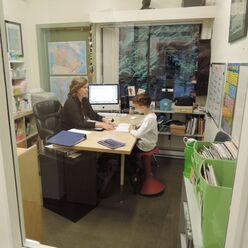 Last post I shared with you the commitment of our school to deliver on the promise that all children have the right to read. In that piece I noted that there were three key components to making that happen for kids: the systematic application of the science of reading to the learning process; the application of cognitive load theory to direct instruction; and, the application of distributed learning strategies to ensure mastery. First off then, let's take a look at how we use the science of reading to strive to make all of our students proficent and effective readers. I should note, that at KGMS we have established a framework of instruction based upon Universal Design for Learning. Before you mentally roll your eyes, you have to understand that if you want every child to be the best reader that they can be, you need to structure your school to provide universal supports, teaching and reinforcement approaches, and assessment strategies that will meet the needs of every learner. Our approach is to take the student from wherever they are on their learning journeys and help them get to where they need to be. The first step in this journey is to provide every student in the school with 45 minutes of direct, one on one instruction every single day with a qualified Orton-Gillingham (systematic phonics) tutor. Logistically, how does this work? Our class size is maximized at 18 students. Each core group of 18 is led by two qualifed teachers who share the instructional load. One block, each day, the entire class goes to tutoring. They leave their classrooms, walk to the tutoring wing, and each student goes into an individualized tutoring office to meet with their dedicated, trained instructor. This is where one facet of universal design comes in. Although every student is doing the same thing - meeting with their individual tutor - every single student is doing something different, depending on the stage of their personal reading development - decoding, morphology, comprehension etc. Some are learning to read, others are reading to learn. No-one is being pulled out of class (and missing other instruction) and no-one is being centered out because they don't read as well as their peers. Instead, every student gets a daily dose of face to face, personalized interaction with an adult who is focused entirely on their needs. That attention alone, from a social/emotional standpoint, is worth its weight in gold. From the student perspective, tutoring is a shared daily activity where everyone is doing the same thing. From a teaching and learning perspective, it is the ultimate in differentiated instruction that is the core of universal design. While they are in their tutoring sessions, their core teachers co-plan, review IEPs, meet with specialized support staff or just have some down time for a coffee and chat together. By the time their students return, everyone is recharged and away they go. Our teachers all have basic OG training as well so classroom language arts instruction is consistent with the approach taken in tutoring, and when report cards and parent interview times come around, the teachers and appropriate tutor write reports and meet jointly with parents. Everyone is on the same page. A key part of this process is the ongoing use of assessments (DIBELS, DRAs, Foundation Skills Assessments, etc.) to track progress, inform where ongoing modifications to approaches might be needed, and to establish benchmarks that tutors, teachers, parents and students can see and understand as the learning process takes place. Currently in British Columbia the principles of inclusion are highly valued and remain an aspirational goal for parents and school systems. The reality of the ground however is that supports for a wide number of students is highly dependent on a few individuals in each school - special ed resource teachers, educational assistants, and a few outside district resource staff who visit on a rotating basis. As a result, (as was painfully obvious during the last two years of COVID restrictions), if any of the specialized resource personnel are absent from school, there is no back-up to provide the necessary supports for students with exceptional needs. This has often resulted in students being asked to stay home from school until their teacher or SEA returns. In our case, the entire school is the support system. If one member of the student's school team is away, the supports don't change, but the person delivering them might. In tomorrow's third and final post. We will take a look at how our classroom teachers use cognitive load theory to inform their practice for direct instruction and how the teachers and tutors, in partnership, apply distributed learning practices to ensure mastery of skills and content. 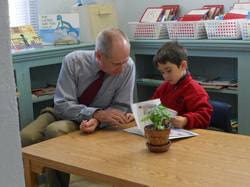 In January 2022, the Ontario Human Rights Commission produced its landmark report: Right to Read: Public Inquiry into human rights issues affecting students with reading disbilities. In its introduction, the report states: "For most students, but particularly vulnerable students, reading outcomes depend on the quality of reading instruction they receive. Nearly all students can learn to read words proficiently with science-based systematic and explicit instruction in foundational reading skills. Identifying and intervening early with the small number of students who may still struggle to learn to read words well, sets them up for future success in school, work and life." Over the past half century, Kenneth Gordon Maplewood School in North Vancouver has dedicated itself to the premise that all students can read through science-based, systematic and explicit instruction in foundational reading skills. The KGMS programme is intensive, targetted and highly sucessful for students of all ages with a wide range of learning challenges. The answer for the school has been to effectively concentrate highly trained personnel on the task of meeting the needs of students with the greatest needs. In fact, Kenneth Gordon is a Ministry of Education designated Special Education School in which every single student has a specific, identified learning disability. While about 60 percent of students struggle with a language based learning challenge such as dyslexia, a further 30 percent are on the autism spectrum and the remainder have had their ability to read derailed by a wide range of other barriers to their learning. Now this might sound to people as the antithesis of inclusion and, although the range of students is as diverse a group as you will find anywhere, they would be right in the traditional sense of inclusion as "mainstreaming". However, as many parents, teachers, and even school systems have come to realize, traditional approaches to inclusion (regardless of the fanfare with which they are introduced) basically do not work. The secret, from both a logistical and financial standpoint, is to concentrate resources to ensure the most effective intervention possible. For most students, this means two or three years on this kind of intensive instruction before they transfer back to their local schools to proceed, as proficient readers, on a level playng field with their peers. As the Ontario Human Rights Commission Inquiry states, these students need "science-based systematic and explicit instruction in foundational reading skills" to be set up "for future success in school, work and life." This intervention model, is not some magic formula. It is based on the science of reading, cognitive load theory, and distributed practice. And, it could be implemented tomorrow in every school district in the country through a redeployment of existing teaching and support personnel and concentration of students in dedicated learning centres. In the next two posts we will look at the key research-based practices that make this approach work for kids.  Tomorrow, our school heads out on Spring Break. It has been two full years since BC declared that the COVID-19 outbreak was indeed a pandemic. For the first couple of months, we all looked inward, avoided contact with family and friends, did grocery shopping with silent focus and eventually, for us and your children, returned to school with an encyclopedia worth of restrictions. It was tough love, and it worked! Eventually, things eased up a little, we got used to masks, washing our hands, and keeping our distance. We waved and gave thumbs up to one another and, we waited. Vaccines came. We took our turn, got our jabs and slowly things returned to a semblance of normality. Delta set us back and Omicron roared through, but we got our boosters, wore our masks and, we waited. Slowly but surely, we have moved forward. Our self-obsession has lessened, our confidence has increased, and we have taken steps, first tentatively, then with more determination, to move forward and get on with it. The light is definitely at the end of the tunnel and we can see it. Imagine though, that you have fought this good fight not in B.C. but in Ukraine. Imagine that just as you thought that life was going to get back to normal, the unimaginable happened, that your neighbour, who had suffered alongside of you, decided to take out their angst and their frustration on you. Imagine that the hospitals that two weeks ago were caring for COVID patients, birthing babies and performing life-saving surgeries were now being pounded into dust and a Spring of hope had turned into a season of suffering and terror. The next two weeks will be a time of renewal for us. A time to relax and perhaps travel for the first time in twenty-four months. Life is returning to normal, for us. Please take some time over the next two weeks to think of our friends, relatives and allies in Ukraine. The pandemic first taught us to look out for ourselves, and then our neighbours, and then society as a whole. Let’s apply those lessons to our comrades a half a world away and keep them in our thoughts and prayers. Have a restful, reflective, recuperative and relaxing holiday. 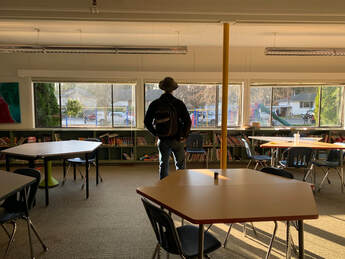 Often, I read posts from educators, authors, and publishers extolling the virtues of a "system" for teaching through a pre-packaged programme. There are math programmes, spelling programmes, reading programmes and even remediation programmes. Teaching, for some of these advocates, was seen as being a bit like cooking. The students were the ingredients, the recipe for learning was the programme; and the results were “guaranteed” no matter what the quality of the chef. The desired end result was straightforward – students had to complete the programme. Consequently, disruptions like field trips or drama productions or sports competitions or special assemblies were seen as irritants that interfered with “real” learning and led to complaints that with so many interruptions, the students would never get to the last chapter of the textbook. But good schools are not fast food franchises, and good educators are not chefs. Schools must be studios of creative learning experiences and the staff must be artists in residence. Artists who have a vision of the future for their students and seek to create the means to have them realize it. Some do it intuitively but the best do it deliberately. They are the “backcasters” in our midst. What is a backcaster? Well, to begin with, you might think that it is just the opposite of a forecaster, in other words, a predictor of future events. But that would mean that teachers are only good at predicting past events, as in “I taught it, but they didn’t learn it” (Assuredly not a really useful skill!) In actual fact, “backcasting” takes “forecasting” to a new level. Where forecasting looks at current trends and tries to analyze what they mean for future conditions (like a weather forecast); backcasting looks at a possible future and then works backwards to determine what factors or interventions will be necessary to construct the future that we desire. Environmentalists use both methods, constructing models of future degradation based upon business as usual and contrasting that with the preferred future and determining the actions that society needs to take to get there. In a “macro” educational environment, that is called “backwards curriculum design”. You identify desired outcomes and then work backwards to create assessments, develop resources, and determine teaching strategies that will get your students where you want them to go. At Kenneth Gordon we also engage in “micro” curriculum design through developing individual education plans (IEPs) for each of our students. We “backcast” from where we want them to be, through reverse steps, back to where they are now. Along the way we establish benchmarks and assessment criteria to measure progress (and help with mid-course corrections) and then when it is all in place, we reverse direction and begin to move forward to our preferred future for each child. Not surprisingly, this is more complex and challenging than simply implementing a packaged programme or slavishly following one single methodology for teaching and learning. It requires continuous training, reflection, and reinvention as we continuously adjust to an ever-changing learning pathway. When we accept students into our school, we don’t compartmentalize them according to a “diagnosis” or label. We backcast. We know our desired outcomes, we understand the child’s current strengths and challenges and we decide whether or not we can build an individualized programme that can get her or him from where they are, to where they need to be. If the answer is yes, then we welcome them with open arms, regardless of what label someone else might affix to them. Ironically then, an effective backcast is the most effective and proactive forecast of student growth and achievement. So next time you see us looking over our shoulders – you know where we are coming from – and where we are going!  Last month I ventured out of the country for the first time since February 2020. My destination? Nottingham, England. Having left my rental car in the Maid Marion car park, I took the opporutnity to visit Nottingham Castle, wander up Friar Tuck lane and soak in the wonderful atmosphere of this ancient market town. Having said that, I wasn't just there as a tourist. My actual purpose was to spend a Saturday sharing ideas at a ResearchED conference with teachers and administrators from around the region, and specifically to talk about how we utilize Universal Design as a philosophy and framework for our research-based approach to meeting the needs of students with diverse learning needs. As most people are aware, Universal Design is known more as an architectural concept that an educational one. But, in actual fact, the principles used in designing buildings, or innovative assistive technology or personalizing learning are much the same. The basic precept is that "what is necessary for some" is potentially beneficial for all. Automatic doors at the grocery store allow people with mobility issues to enter easily but also open up to ensure that I can get out with my giant shopping cart or arm-load of impulse bought packages. Close captioning for hearing impaired individuals provides me with the ability to read the news broadcast on the ceiling of my dentist's office, or "hear" the play by play of a baseball game in a noisy sports bar. My school is ramped to be accessible, but most of the use of those gentle slopes is to move furniture and supplies easily in and out of the building. In short, often innovations designed for one specific purpose have a host of spin-offs that benefit a much larger target group. In our school we have adopted a universal design approach to how we teach, provide supports for students who are struggling, organize our timetables and design and furnish our classrooms. Our programme is characterized by direct instruction based upon cognitive load theory; daily one on one tutoring which utilizes the lessons of Ebbinghaus's "forgetting curve" and the mechanics of systematic phonics for children who are struggling to read. We draw upon such disparate sources as Daniel Pink (When) and the research on timing, pacing and the use of physical breaks in the out of doors; Andrew Solomon (Far from the Tree) who looks at parenting neurodiverse children; the outstanding brain research of Stanislas Dehaene (Reading in the Brain; How we Learn); Dan Ariely (Predictably Irrational); and even Neil Postman (Building a bridge to the eighteenth century). So how does Univeral Design fit in to all of this? UDL reminds us that, while "one size does not fit all", teachers, and classrooms and schools need an all-inclusive framework that allows for the variances in student needs and gives the learners options that will help them (with teacher direction and support) to construct a personalized programme approach that will work for each and every one of them. Our school is "exclusive" in that we only admit students with identified learning challenges. Having said that, it is also incredibly inclusive because when we recognize that everyone is following their own unique learning path, being "different" becomes the norm. By the way, it took me quite a while to get out of Nottingham on the Sunday following ResearchED because, of course, it was the day of the Robin Hood marathon! 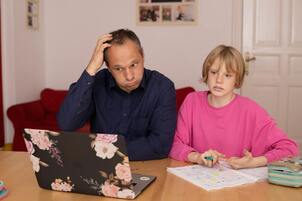 For schools in British Columbia there is a bit of a (slightly smug) view that we "dodged the academic bullet" with respect to COVID-related lockdowns and disruptions in learning. Altlhough the whole province was out during April and May of 2020, the last year and a half have been generally characterized by modified timetables, cohort management, and following public health protocols as best we can. School has had the feel in general of business as usual and teachers and students have attempted to move forward as if nothing had really happened. Generally it is assumed that the whole exercise (while bumpy) has seen a relatively seamless transition back to a semblance of normal. The challenge in this assumption is that it reflects systems thinking rather than looking at the small scale personal costs that many students in the province paid. In February of 2021, the Ministry of Education published a study of the some of the impacts of the short-term lockdown on the graduating class of 2020. Although there are some positive aspects to the picture that the report paints, there are also some glaring societal concerns that we should all keep front of mind. What the COVID 19 Student Impacts report shows us is that even in a levelling experience such as a total system lockdown, there were disturbing variances in the outcome. The study looked at the the June 2020 grads and found the following: (note: in none of these statistics is there any comment on either the qualifty of the educational experience or its impact on post-secondary performance). - students who were enrolled in "bricks and mortar schools" felt generally little impact upon their educational path. Over 90% graduated and did not return to secondary school in September while around 5% did not graduate or return to school at all the next fall. In distributed learning schools (chiefly online) only about 20% graduated while another 30% returned to complete their diplomas. It should be noted that the largest group (around 40%) neither graduated or returned. In more traditional continuing education programmes, those numbers we even worse. - for what the authors characterize as "more vulnerable subpopulations" within the province the numbers are also discouraging. Large numbers of ELL students (50%) , Indigenous students (40%) and Special Needs students (40%) did not graduate. The majority returned to finish their schooling but significant numbers did not. Of particular note, of the 48,110 first-time Grade 12s in the 2019/20 cohort approximately 14.1% (6,809) had a disability or diverse ability ("special needs designation" or " learning disabled designation". However, almost one third (1,384 or 31.9%) of the 4,284 students who did not graduate in June but returned to school in September had a designation. And, even more disturbing, of the 4,671 students who did not graduate and did not return to school in the fall of 2020, 21.4% had a designation. It would seem that our "success story" had some victims. A disproportionate number of students with a Special Education designation failed to graduate in June and either had to return to finish their diploma or dropped out altogether. So where does this leave us? It is clear that a one size fits all approach to systems management, results in large gaps in service to vulnerable populations. Students for whom English is a second language, indigenous students, and students with a Ministry Special Education designation were especially disadvantaged by even a relatively short, two month, lockdown. One can only imagine the even greater impact in those provinces and international jurisdictions, such as the United States, where there were either multiple lockdowns or even year-long closures, has had upon their more vulnerable learners. Education systems that merely look at the "learning gap" for students that remained in school are ignoring what will be an even greater social/educational issue in the decade to come. 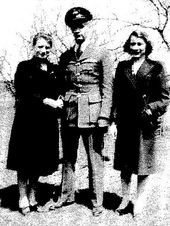 Most years on Remembrance Day, I post a reflective piece about my Grandfather, Dad and Uncles who served in the armed forces in two World Wars and the impact that they had on my life. This year however, is a little different. I was rummaging though family keepsakes over the past few weeks and stumbled upon two small lapel pins that I had kept a few years ago after my Mom passed away at the respectable age of 94. The first, belonged to my Grandmother. It was given in recognition of her work as an "Emergency Reservist" during World War I. This was in reference to the creation of the Women's Emergency Corps which was established in order to place women into the crucial war effort jobs in Canada so as to allow more men to transfer overseas to the fields of Flanders. The second - "Women's War Work" belonged to my mother whose war effort involved working at a General Motors plant which had been converted from car assembly lines to the production of personnel carriers and tanks for use in the Second World War in Europe. Two small pins which tell a very large story. War is not just won on the battlefield. To be successful in a national conflict, a country has to mobilize everyone. There is no room for selfishness, no room for passing the buck to someone else, no room for deciding that your inconvenience is more important than someone else's life. This year, Remembrance Day takes on a very different tone. For my generation and younger, it has always been a time to reflect and remember the sacrifice of others. But this year is different. This year it is us who are being called upon to sacrifice in order to save the lives of our friends, neighbours, family and even passersby on the street. COVID has brought an expected new level of social responsibility to our day to day life. We have done a great job of praising, in the abstract, the selfless actions of our ancestors. It is now our time to step up and do our part. Wear a mask in public, practice physical distancing, avoid crowds, don't travel - in short, take a little personal responsibility for fighting an international crisis. The soldiers in this battle are our health care professionals, research scientists, essential workers in transportation, food distribution and sales, civic employees, teachers, and childcare workers. And we are the citizen "army" that has to have their backs. Please stay safe over the coming weeks. Tomorrow is Remembrance Day and a perfect time to recommit to winning our battle against this global pandemic. Our forebears would expect nothing less. Lest we forget. 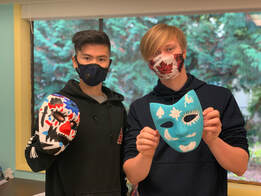 End of October! Kids and parents are usually gearing up for the day that outperforms every other holiday that you can think of. But, perhaps, not this year. Classroom celebrations, trick and treating, and costume parties will be largely absent and the day may even go a little unobserved this year. Even the government, jumping on the "grinch" (sorry for the mixed metaphor) bandwagon has announced that this will be the last year for Hallowe'en fireworks. Even the thrill of mask-wearing has become a little passé as covering our faces has become a social imperative, rather than an exciting aberration! So, let’s face it, it's pretty clear that Hallowe’en will be a little anti-climactic this year! After all, we’ve all been wearing masks for months. In fact, as we continue to navigate through the ups and downs of this remarkable time in our lives, it is really quite astounding to see the extent to which the “new” normal has simply become normal. The real question is what will happen when the curtain finally closes on the pandemic and our collective response to it. Will things go back to the way that they were? What might change? Will our social interactions remain a little more limited – fewer dinners out? Avoiding movie theatres? Working remotely? Taking more walks and hikes? Fewer evening meetings and more family dinners? Staying a little closer to home on holidays? What do you think the “new” “new” normal might look like in your household? My hope is that we all come out of this having slowed down a bit. That we take more time to appreciate our families and close friends; that we look around more and spend more time in the out of doors; that the highways remain just a little bit emptier and rush hour remains more muted. For those of us who have grown up and lived in the post-war era, this is the first real collective challenge that we have faced as a society. As much as it has had an impact on our lives and ways of looking at the world, it is bound to have a more profound, long-term impact on our children. Decades ago, in school, I saw a movie entitled "You are what you were when". It looked at how generational values had been created in times of social and economic change. Ideas about finance and risk were formed during the Depression, heroism and self-sacrifice during World War II, and a belief in continuous progress during the 50s and 60s. There is no question but that a year of global pandemic will have a major impact on our values and perspectives going forward. So, as a parent, I am looking at this experience as an opportunity for a bit of a re-boot and as a unique chance to strike a productive balance between managing the demands and lures of technology, with a return to a better quality of life. In the best of worlds, the disequilibrium of the pandemic will leave our lives more in balance. And that is not such a scary thought – even on Hallowe’en! |
AuthorDr. Jim Christopher is recently retired Head of Kenneth Gordon Maplewood School and Maplewood Alternative High School in North Vancouver. A parent, author and long-time teacher, and educational administrator across Canada, he has been actively involved in the drive to differentiate learning experiences to meet the needs of all learners. Archives
September 2022
Categories
All
|
What's the difference?
Thoughts on making a real difference in the lives of learners...


 RSS Feed
RSS Feed
